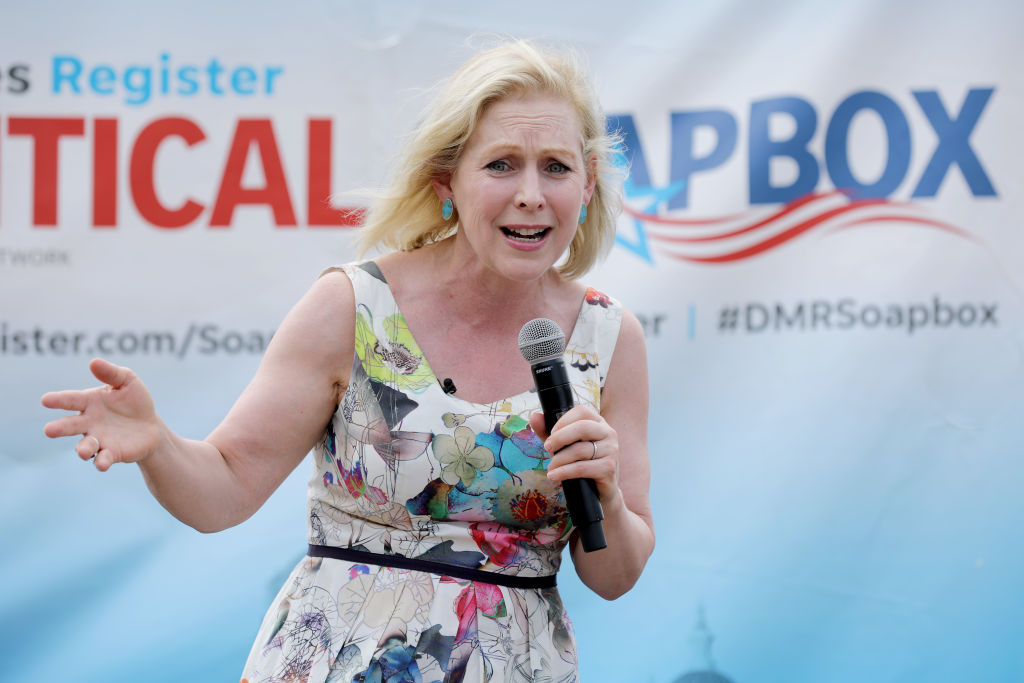When asked by the New York Times why her presidential bid ended in such spectacular failure, Kirsten Gillibrand said, ‘I don’t know… My campaign may well have been ahead of its time.’
Well, that’s one way of putting it. An alternative explanation is that it was a poor choice to construct a campaign specifically to align with the sensibilities of hyper-woke professional class Democratic consultants. Unfortunately for Gillibrand, other female candidates have done perfectly well, with one (Elizabeth Warren) now hovering at second or third place nationally and on a consistent upward trajectory. That kind of precludes Gillibrand from blaming her failure on the unwillingness of voters to embrace a woman as their party’s standard bearer. Rather, her problem was espousing a version of ‘women’s empowerment’ that was condescending, overly-rehearsed, and tethered to a conception of political femininity that exists primarily in the upper-rungs of the Democratic operative sphere.
Gillibrand’s campaign personnel often donned pink attire, as did the candidate herself, which is kind of a stand-in for the superficiality with which she approached her feminist-based appeal. There’s nothing wrong with pink as a color per se (I sometimes wear it!) but when a politician is obviously using a certain gendered hue as a blundering marketing tactic, it’s not hard to glean why voters rolled their eyes. Warren attracts her fair share of feminist support, but doesn’t resort to the same kind of overt identity-pandering; maybe that’s because being a competent woman who can address all the issues at hand is enough of a ‘feminist’ statement in itself.
With her sad withdrawal this week, Gillibrand has managed to accomplish the unusual feat of actually looking worse off politically than when she launched her campaign. Here was a senator from New York – among the most high-profile platforms a presidential candidate can ever hope for – who seldom polled over zero percent. She received a grand total of one endorsement from a Congressional colleague. Her seat was the one previously occupied by Hillary Clinton, Daniel Patrick Moynihan and Robert F. Kennedy, with all the illustrious precedent that entails. She was widely hyped as a Serious Contender early on, and on paper could easily have been formidable. The unavoidable conclusion, then, is that the problem lies with her – not some malicious extraneous force as she implied in the NYT interview.
When observing Gillibrand in action, you almost got the sense that her entire campaign philosophy was based on strategy meetings convened with twenty-something Oberlin grads whose worldview derived mainly from Twitter, Jezebel, and social justice-oriented email listservs for young professionals. There’s nothing wrong with ‘social justice’ as such, but social justice created in the image of hectoring operatives is guaranteed to fall flat. Gillibrand poured more money into Facebook ads over the last 90 days than any Democratic candidate other than billionaire Tom Steyer, and what does she have to show for it? Bupkis. Compounding the embarrassment is that these ads begged for measly $1 donations purely to put her over the DNC-imposed 130,000 donor threshold, a number which she failed to reach.
Perhaps voters simply sensed that the worldview Gillibrand was projecting was fundamentally hollow. For instance, she cultivated the most nominally ‘anti-Trump’ voting record of any presidential candidate since 2017 – voting against virtually all of Trump’s appointments and favored legislation. But simple ‘anti-Trumpism’ uncoupled to any systemic critique of the current political situation is a loser. These votes are not impressive if they’re not accompanied by a coherent, informed explanation for how we got Trump in the first place. Gillibrand never provided this, presumably in the vain hope that some empty ‘Resistance’ sloganeering would prove sufficient.
Any ‘viral moments’ over the course of the campaign were cringe-inducing. There was the lecture she delivered before rural Iowa voters about ‘white privilege’, a concept that in theory can be spoken about in a compelling way, but sounded awkward and discomfiting when emitted from Gillibrand’s mouth. It was almost as though she was reciting a subpar blog post someone had emailed her. At the July debate, she pledged to go around the country explaining ‘white privilege’ to Trump voters, which quite possibly was the worst idea of all time. And when she took her turn hurling a premeditated potshot at Joe Biden, she managed to blatantly mischaracterize one of his decades-old op-eds – as if there wasn’t mountains of material to legitimately attack Biden on.
Off she goes then, with the campaign having demonstrated nought but that the political sensibility she constructed has no resonance with the actual electorate. Most failed presidential candidates are able to at least marshal the networks and influence accrued over the course of a campaign to burnish their career prospects in some other area, but Gillibrand now looks worse off than where she started. Rather than blaming vagaries such as the current ‘times’ somehow not being adequately hospitable to her, Gillibrand truly has no one to blame but herself.


















